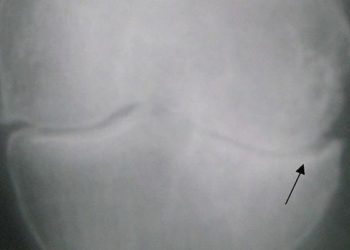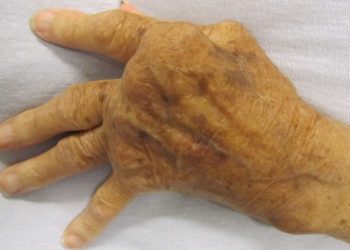Upadacitinib with glucocorticoids superior to glucocorticoids alone for giant cell arteritis remission
1. In this randomized trial, upadacitinib dosed at 15mg with a 26-week glucocorticoid taper showed superior efficacy than placebo with a 52-week glucocorticoid taper for sustained remission of giant cell arteritis.
2. Upadacitinib dosed at 7.5mg was not superior to placebo for sustaining complete remission of giant cell arteritis at 52 weeks.
Evidence Rating Level: 1 (Excellent)
Study Rundown: Giant cell arteritis is an inflammatory vascular disease that affects medium and large-sized arteries, almost exclusively in adults over the age of 50 years. It often presents with symptoms of headaches, scalp or temple pain, jaw claudication, vision impairment, and other ischemic complications. Tocilizumab, an interleukin 6 receptor inhibitor, is currently the only approved therapy for the disease, and glucocorticoids remain the primary treatment despite their toxic effects. The majority of patients have disease relapse when glucocorticoids are tapered. As such, there is a need for effective glucocorticoid-sparing treatments. Interleukin 6 and interferon-γ play a role in giant cell arteritis and signal through the JAK-STAT pathway. Upadacitinib is an oral JAK-1 inhibitor that has the potential to block pathogenic pathways in giant cell arteritis. This randomized controlled trial aimed to assess the efficacy and safety of upadacitinib as compared to placebo, when used in combination with glucocorticoid taper, to treat patients with active giant cell arteritis. Patients were randomly assigned to a 2:1:1 ratio to receive upadacitinib at a dose of 15mg or 7.5mg orally once daily plus a 26-week glucocorticoid taper or placebo plus a 52-week glucocorticoid taper. The primary endpoint was sustained remission at week 52, defined by the absence of signs and symptoms of giant cell arteritis from week 12 to week 52. Results from this study found that upadacitinib at a dose of 15mg was superior to placebo in sustaining remission at week 52. Additionally, upadacitinib at a dose of 7.5mg was not superior to placebo in sustaining remission at week 52. Limitations of this study included a higher-than-expected percentage of patients discontinuing upadacitinib and placebo.
Click here to read the study in NEJM
In-Depth [randomized controlled trial]: This randomized controlled trial evaluated the efficacy and safety of upadacitinib as compared with placebo, when used in combination with a glucocorticoid taper, for the treatment of active giant cell arteritis. Adults older than 50 years of age who had a clinical diagnosis of new-onset or relapsing giant cell arteritis confirmed on biopsy or imaging, and active disease in the preceding eight weeks, were eligible. The primary end point for this study was sustained remission at week 52, as defined by the absence of signs or symptoms of giant cell arteritis from week 12 through week 52 and adherence to the glucocorticoid taper. A total of 428 patients were recruited for this study, where 209 received upadacitinib at a dose of 15mg, 107 received upadacitinib at a dose of 7.5mg, and 112 received a placebo. Of the 428 patients, 70% had new-onset giant cell arteritis. Results from this study showed that upadacitinib at a dose of 15mg showed superiority to placebo concerning the primary end point (46.4% [95% Confidence Interval [CI], 39.6 to 53.2] vs. 29.0% [95% CI, 20.6 to 37.5]; p=0.002). Upadacitinib at a dose of 15mg was also superior to placebo in sustained complete remission, time to disease flare, cumulative glucocorticoid exposure, and patient-reported outcomes. On the contrary, upadacitinib at a dose of 7.5mg was not superior to placebo for the primary end point. Cardiovascular risk is a potential concern with a JAK inhibitor; however, safety outcomes were similar between groups, and there were no major cardiovascular events. In summary, results from this study showed that upadacitinib at a dose of 15 mg, but not 7.5mg, with a 26-week taper showed efficacy superior to that of placebo with a 52-week taper in patients with giant cell arteritis.
Image: PD
©2025 2 Minute Medicine, Inc. All rights reserved. No works may be reproduced without expressed written consent from 2 Minute Medicine, Inc. Inquire about licensing here. No article should be construed as medical advice and is not intended as such by the authors or by 2 Minute Medicine, Inc.









